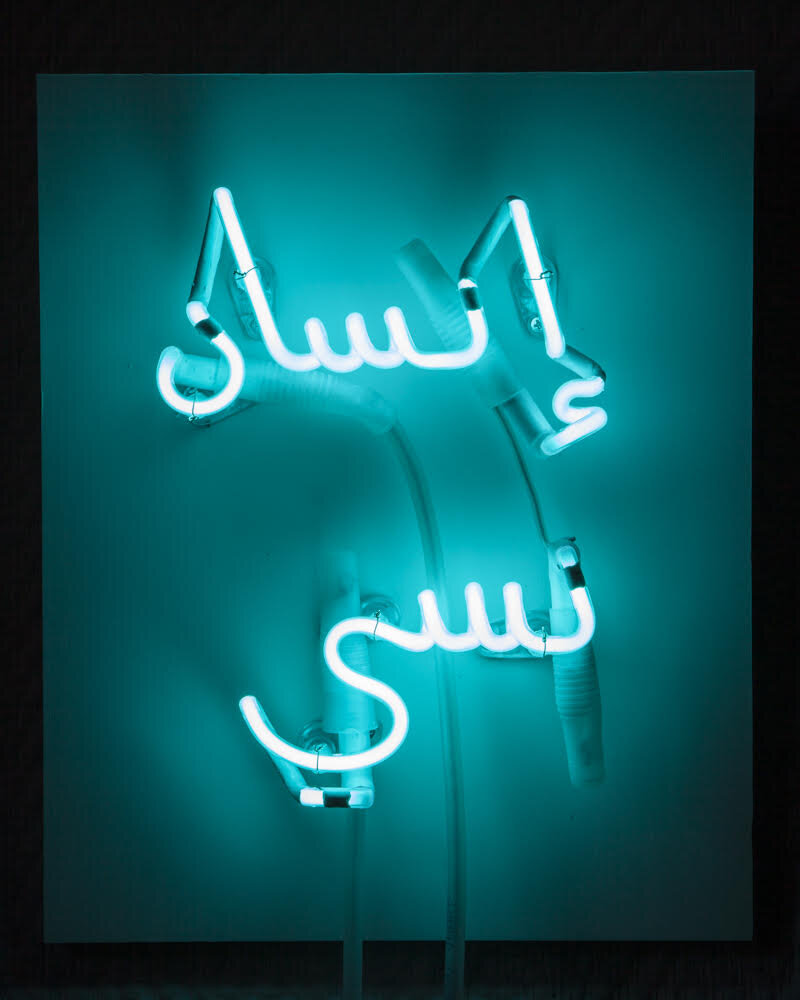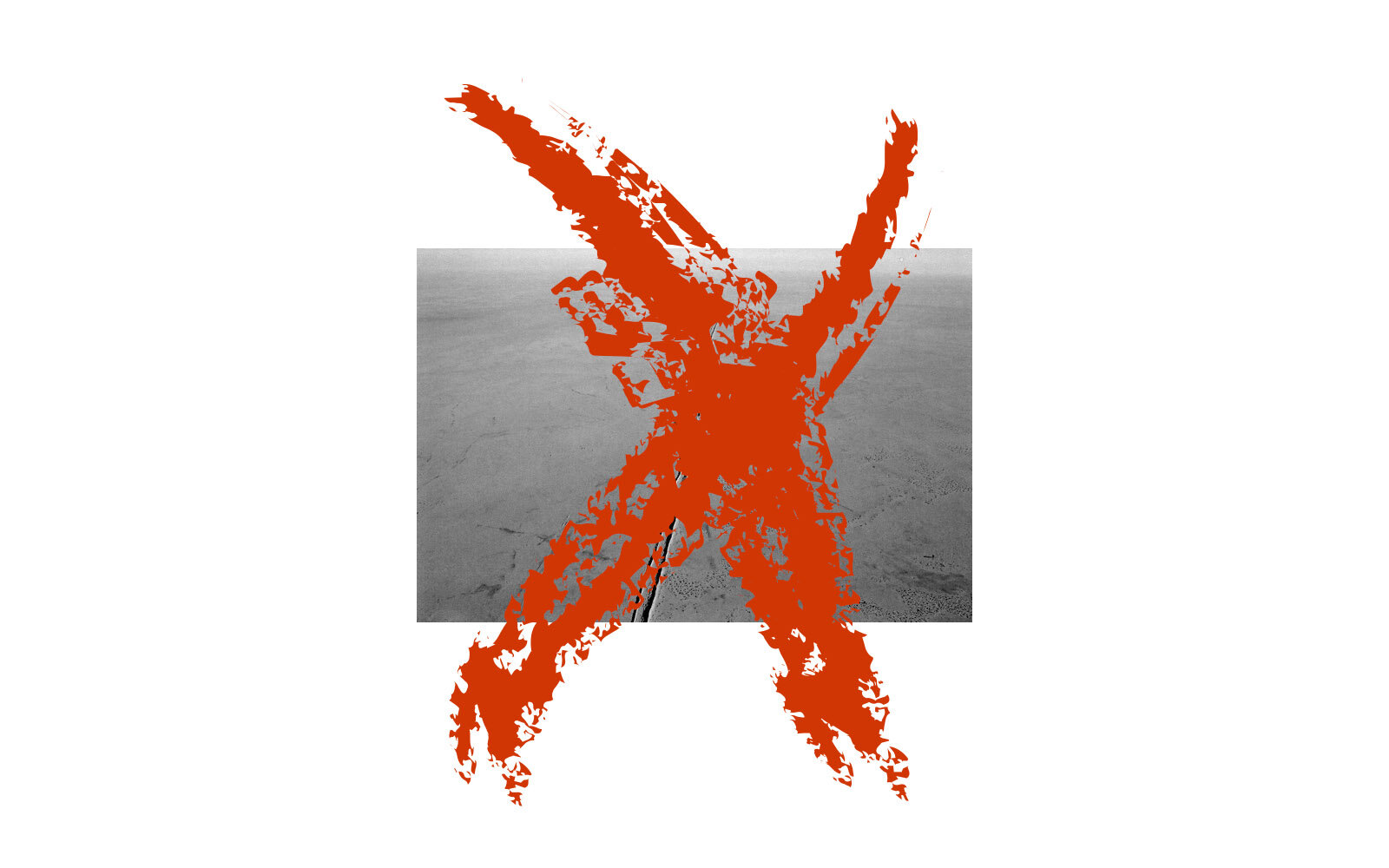We can’t tell you about this wall without potentially being censored or hounded by governments who are sworn to keep it out of the news and the public eye, but our contributor calls this “the wall of walls” or “ghost wall” because it has been so successfully kept off our radar. This is the world’s largest security wall and one of its best-kept secrets. —Ed.
Building Oblivion
The biggest repressive structure in the history of mankind cuts through Western Sahara, a daunting 2,700-kilometer military berm strewn with over three million land mines, and permanently manned by 140,000 Moroccan troops. This military wall separates the Sahrawi living under illegal Moroccan occupation from those living in immense refugee camps at the westernmost frontier of Algeria, with a vast inter-zone of the Liberated Territories, lands reclaimed by the Polisario Front, the armed branch of the SADR (the Sahrawi Arab Democratic Republic). In spite of its gigantism this repressive wall remains virtually unknown today — a paradox in the era of internet and social networks where we naively believe that no injustice can go unnoticed, convinced as we are of being alert and well-informed on all matters.
The staggering Sahara Wall perfectly symbolizes the level of investment that Morocco consecrates to the repression of the indigenous Sahrawi people, the annexation of their lands and the spoliation of their natural resources. Under the cover of the wall, it is with total impunity that the Moroccan kingdom has engaged in the organized theft of the world’s richest phosphate mines, while licensing industrial fishing in Sahara coastal waters, among the richest in the world, and illegally selling oil and gas exploration blocks to major international oil companies.
Here, the term of strategy is inapplicable for we are no longer within the realm of ordinary politics. It is the phenomenological integration of the “Infamy of Walls,” an exception of modern times wherein a tyrannical power applies extreme measures to resolve momentary needs, confused with more permanent necessities, and reverts to the feudal technique of constructing a wall. But in this case modern ingenuity perverts the defensive origins of the wall to transform it into an implacable tool of oppression.
The first wall of this type to be constructed in modern times was raised by the Nazis to make of the Warsaw ghetto a death camp in an urban environment. The second was the Berlin Wall from which the world has yet to recover in spite of its destruction in 1989. The third and by far the most stupefying in all aspects, is the one financed by Saudi Arabia and built by Israel for the kingdom of Morocco with the assistance of France and the United States in Western Sahara, in order to prevent the Sahrawi people from returning to their lands. The fourth wall being the one that Israel is actually consolidating to encircle the Palestinians. However, it is the Sahara Wall that is by far the most incredible construction of repressive nature of our era — one that is closer to the realm of science fiction than it is to reality.
Paradoxically, Israel has had considerable competence in building walls of repression, surveillance and separation. Historically, Jerusalem had furnished Pretoria with the surveillance technology for its borders with Namibia and Angola and it had built the electric fence along the Zimbabwe border to assist South Africa in fighting the ANC and SWAPO. This experience and that which it had acquired during the construction of the Bar-Lev Line built along the Suez Canal during the Kippur War, were put to the service of Morocco to build the gigantic military wall that separates the Sahrawis from their homeland in Western Sahara. In turn, this has proven to be vital experience for the wall which Israel has built around the Palestinian population.
Little information and hardly any images are available concerning this edifice, this ghost wall; in spite of its monumentality, it was built in secret and remains largely unknown to the general public in the Occident —not that the wall would be invisible. It is our collective conscience that has vanished, totally absent when faced with massive injustice, so taken are we by our permanent quest for entertainment. We thrive on divertissement, shying away from anything that might prove challenging to the moral values we once held. It is true that press censorship concerning the Sahara Wall is total; indeed the entire question of the unilateral annexation of Western Sahara by Morocco has been effaced, but this does not excuse our ignorance on the subject. The wall’s invisibility in spite of its gigantism is the perfect reflection of the incurious society which is ours.

Never have the architects of this type of wall been in their right; never have these projects of massive repression and confinement of populations ever been able to override justice in the long term. Which doesn’t prevent each one of these constructions from being a heavy mortgage on the future of humanity. Walls of this type are the most faithful indicators of injustice.
If the wall enclaving the Palestinians is no secret, who among us has heard of the Sahara Wall, four times longer and far more lethal? The international community still has the atavistic reflex of looking to France as being the historical authority for all matters concerning the Maghreb, the nation knowing the ropes through its colonial experience in North Africa. But in France there is no freedom of the press concerning this particular issue. Why? Apart from the evident geopolitics, many owners of the big French dailies as well as the directors of media have their very own riad (private palace) in Morocco. How then could they possibly permit a journalist to publish an article or air a program going against the interest of their royal host?
Those rare journalists who do make it to the occupied territories of Western Sahara are regularly evicted, their equipment confiscated by the Moroccans, (fifty-six journalists were evicted from Western Sahara in 2014 alone). Numerous European parliamentary members investigating human rights conditions of the Sahrawi have also been summarily expelled by the Moroccan occupational authorities. Even the United Nations Mission for the Referendum in Western Sahara, (MINURSO), has suffered the humiliation of having its equipment regularly confiscated by the Moroccan army.
By the very paradox of its occulted gigantism, the Sahara Wall, the wall of all walls perfectly symbolizes this very particular form of oppression, the construction of oblivion so massively applied to the Sahrawi people.
Here lies a major cause, fundamental in its symbolism, a barometer of international law and its failure. The invasion and unilateral forceful annexation of the coveted neighboring territory of Western Sahara by the expansionist Moroccan regime in 1975, left unsanctioned by the international community, gave Saddam the green light for similarly invading Kuwait. Illegal actions thus left unpunished encourage others to do likewise.
Paradoxically, some of the worst warrens of torture are those perceived as tourist-friendly countries, passing for champions of international justice. Cynically, Morocco’s King Mohamed VI went as far as to organize a Human Rights Forum in Marrakech in November 2014, all the while brutally repressing the Sahrawi. The self-proclaimed “king of the poor” was fingered by Le Monde in February 2015 as one of the protagonists of the HSBC Swiss Leaks for the fraud of millions of euros.
France holds the key in that Paris is the accomplice to the crime. In flagrant violation of the United Nations Charter, and specifically Article 24, France abuses its role as a permanent member of the United Nations Security Council, systematically vetoing any motion to investigate the human rights issues in these territories illegally occupied by its partner, Morocco. Yet the resolution of the conflict could be simple: if Paris were to refrain from interfering and adopt the impartial position legally required of any permanent member of the United Nations Security Council, the conflict would stand a better chance of being resolved. But Paris stubbornly plays its card in the Maghreb, systematically favoring Morocco, and opposing itself to Algeria and the vast majority of those African nations favorable to self-determination for the Sahrawi. Beyond the fact that France has strong commercial and political ties with Morocco, it is tempting to consider that this reflexive opposition to anything Algerian would be due to the fact that France has never digested the hard-won independence of its former colony; a sort of psycho/political grudge handed down to successive generations of French decision-makers ever since Algeria obtained its independence in 1962. And France has traditionally relied on Morocco’s complicity in any action undertaken against Algeria. In this relationship Rabat very often did the dirty work for Paris: facilitating the arrest of Ben Bella and other protagonists of the Algerian independence movement, and seizing arms shipments destined to the freedom fighters. The Moroccan monarchy is an expansionist regime, historically claiming territory as far as Timbuctoo, all of Mauritania, and even attempting to seize a third of Algerian territory during the War of Sands in 1963, the year following Algeria’s hard-won independence of 1962.
The Sahrawi nation, SADR (Sahrawi Arab Democratic Republic) constitutes just the kind of refulgent example of liberty we should urgently be seeking to discover in these times, when Middle Eastern and North African matters often appear corrupt and rife with terrorism. Here is a young nation where democracy has come intrinsically, where freedom fighters put down their arms and chose the route of diplomacy and international law without ever having had recourse to any form of terrorism. A country where women’s rights are respected with sexual parity, (women minsters have always been a part of the Sahrawi governing forces). The young nation, home to a moderate form of Islam, holds the record for literacy on the African continent, with 100% of the population reading and writing.
Above all, in my opinion, is the fundamental fact that this new nation is recognized by a majority of African nations, countries such as Algeria, Angola, Nigeria and South Africa. Having acquired their very own rights following recent and harsh struggles, their vision of such questions as emancipation and independence is far more perspicacious than is ours.
—Jean Lamore, Paris, May 2021




